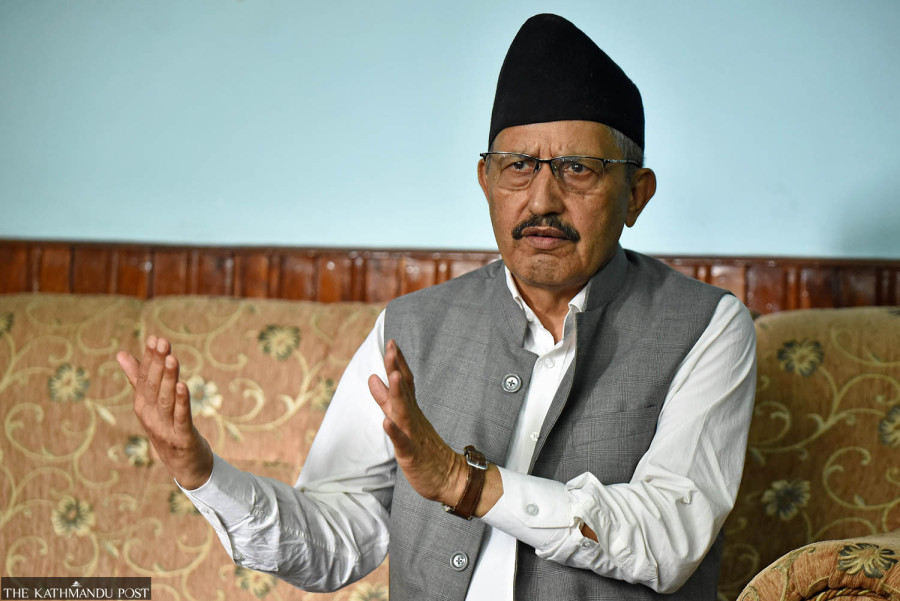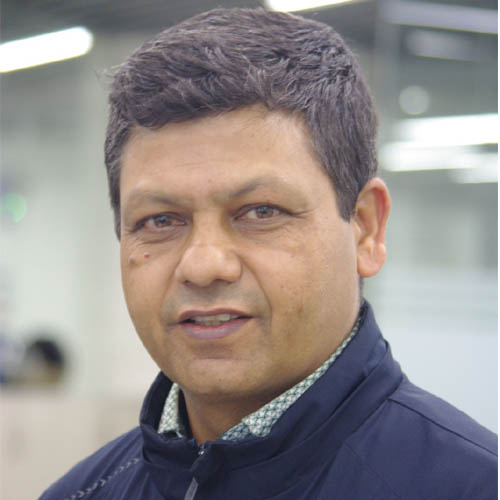Interviews
Congress-UML constitution revision proposal against election mandate
A polarisation between those who want to protect the statute and those who want to trample on it has become inevitable.
Thira Lal Bhusal
The CPN (Maoist Centre) has either led or been a part of the government for most of the past decade and half. But the most recent Maoist Centre-led government under Pushpa Kamal Dahal was ousted only last month. Following this, the party’s senior leaders are in marathon meetings. The Post’s Thira Lal Bhusal asked Giriraj Mani Pokharel, the Maoist Centre deputy general secretary, on the party’s review of the turn of events and its future strategy.
The Maoist Centre is now out of the government. How does the party intend to go forward?
We have started a series of party meetings to review the overall situation and to set the party’s agenda. We held a meeting of the office bearers that ran for five days. Now the party’s standing committee meeting is underway. After this, there will be a central committee meeting. That will take the final decisions on the party’s strategy and programmes for the coming days. In the meetings, the party chair has asked the leaders to discuss national as well as party issues frankly and honestly. At the end of the meeting, we will make an objective analysis of the overall situation and prepare an action plan.
The Central Committee endorses the decisions. But the meetings of the office bearers and standing committee set the agenda and orientation for the party. What have you decided so far?
On the national front, obviously, the dissolution of our government and formation of a new alliance is an issue. Leaders of the new coalition have said their alliance is for making changes in the constitution. They however are still not transparent. Based on their statements, it can be said that they are going against their own pledges. During the election campaign, they had said nothing about changing the constitution. You don’t find it in their manifestos as well. But in the middle of this five-year tenure, they have come up with a new agenda.
A question arises: Can they change the constitution? Doesn’t that violate the mandate the parties got through the elections? Generally, the constitution might be reviewed after 10 years of its implementation. But we haven’t implemented it in a full-fledged way as we don’t even have all the laws required for its effective implementation. We have just agreed to conclude the remaining tasks of the peace process. So, the proposal to amend the constitution without first completing the basics required for its implementation is wrong. They want to make changes in the proportional inclusive system of our constitution.
A political force can work to secure a majority in the House through general elections and ensure stability in the country. We accept that. We have also been lobbying for a directly elected executive president for political stability. They are not ready to debate on that. But they want to revoke the inclusive system, a major achievement of the 2006 people’s movement. This system has empowered historically excluded and deprived communities. We have to enhance the capacity of these groups instead of depriving them of their rights. If there are anomalies in the system’s implementation, let’s develop methods to more effectively pick our representatives. But the ruling parties seem intent on turning back the clock.
Some leaders have publicly announced that they want to end the role of small parties. There can be a number of political parties in a country like Nepal, which is rich in social diversity. We adopted federalism for the same purpose. The leaders give priority to their family members and loyal ones while selecting election candidates and blame the constitution for the ensuing mistakes. They want to rule the country indefinitely through a two-party system. So we think the Congress-UML alliance is on the path of regression. Republicanism, federalism, secularism, inclusion and socialism-oriented systems are integrated five pillars of the present constitution. No attack on them will be tolerated. This is one focus of our ongoing meeting.
We are also discussing some fresh international issues such as the developments in Bangladesh. We have yet to get a complete picture from there. But we can still learn some things. The centre of global affairs is changing and shifting to Asia. More importantly, there is a strong influence of such geopolitical forces in Nepal as well.
Party chair Pushpa Kamal Dahal has said that there was an external hand in the recent change of coalition.
External elements are active, in one way or the other. Some want to make our country a playground of external forces but our party and party chair firmly stood against it. The forces that wanted various things but didn’t get them from the government then started searching for a character suitable for them. People aren’t aware of such unseen elements but we should be careful. In the meeting, we are discussing this issue as well.
Do you think geopolitics is the major reason for the ouster of the Dahal-led government?
In his third term as a prime minister, Prachanda was working with certain priorities such as good governance, social justice and prosperity. He had taken governance seriously. Previously, there was a practice of exploiting state coffers in collusion between politicians, big businessmen and bureaucrats. The Prachanda-led government strongly stood against such a nexus. Actions against those involved in Bhutanese refugee scam, Lalita Niwas land grab, Bansbari Leather Shoe land scam, and gold smuggling are some examples. The government formulated a law to address the problems of loan shark victims. But some individuals associated with the coalition partners were involved in the scams.
Were these bad elements linked to the Congress or the UML? Dahal entered into coalitions with both.
The individuals were linked to partners in both the coalitions. The party chair made good governance his main priority but the Maoist Centre is the third-largest party so his hands were tied. When certain individuals were brought under investigation in corruption cases, the initiatives to change the government were expedited overnight. We can conclude that Prachanda government’s anti-corruption moves inspired other parties to oust it.
You mentioned external interference as well as other parties’ fear of the government’s anti-corruption actions. Which one was the major reason for government change?
The government’s anti-corruption drive is the main reason behind the formation of the new coalition. This drive brought the two largest parties together to form a government, which is unusual in the parliamentary system.
The government is working to increase the threshold to secure seats under the proportional representation category. The proposed provision is against small parties, and the Maoist Centre has opposed this. Do you see the possibility of polarisation among the parties on this issue?
When the ruling parties introduce new proposals that were not even discussed during the elections, we will definitely oppose them. We led the previous movements for people’s rights and we have to secure these rights. Thus the polarisation between those who want to trample on the statute and those who are against such attacks is inevitable.

Is the Maoist Centre preparing to unify with other parties including the Nepal Communist Party led by Netra Bikram Chand Biplab?
First, we are in the final stage of merging with the outfit of Mahindra Raya Yadav. Also, the Biplab-led party has endorsed the party unity proposal. We have to iron out some theoretical issues and make the party line clear in the changed national as well as international context. Dialogue between us is headed in the right direction.
You earlier said party chair has urged other leaders to openly debate issues. Have they discussed why the Maoist party has lost its strength as well as the issue of the party chair holding leadership continuously for three and a half decades.
Comrade Prachanda led the decade-long people’s war and subsequent political movements as well as the peace process, all of which made epochal changes in Nepal’s political history. No one can deny this. Therefore, Prachanda doesn’t need any position in the party. He is now a nationally as well as internationally established personality. But our party as well as the country needs him. Therefore, the discussions in the party are now aimed at making the best use of his personality in the larger interest of the society. As far as the reasons behind the setbacks we faced in the recent time are concerned, we had rightly assessed the situation in the past.
But we couldn’t adapt to the changed context. We failed to develop our culture and lifestyle in line with our guiding ideology. Similarly, we failed to run the party in a proper way. We gave up our agendas and became power-centric. We developed anti-proletariat tendencies. We were gradually distanced from the public. Now we have decided that we must reestablish our relations with the working class and the oppressed. We have also failed to communicate about the important works we did when we were in the government. We need to tell the people what we did in their favour when we were in government in the past 15 years. There will also be some serious soul-searching.
There is a perception that the Maoist Centre and its leaders are incapable of staying out of power.
Our party’s general convention had decided to maintain a right balance in the party’s role in the government, Parliament and the street. It is true that we were in the past more engaged in the government. The party chair has already said that our focus won’t be the government from now on.




 10.12°C Kathmandu
10.12°C Kathmandu












